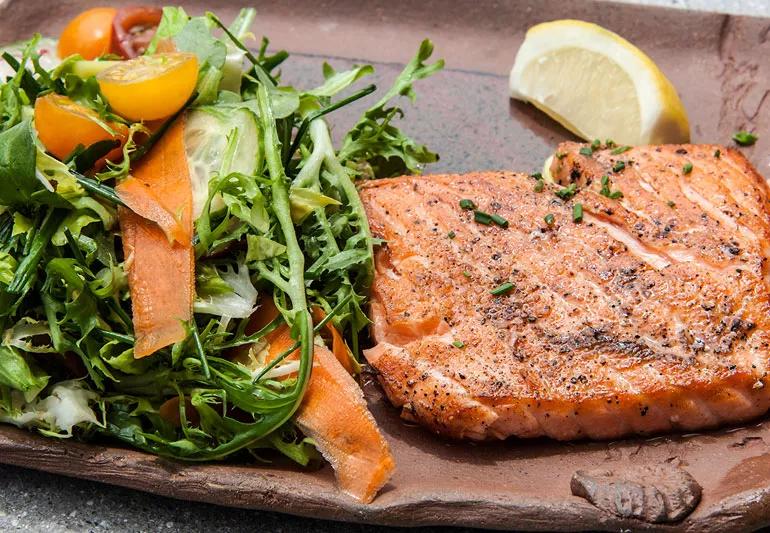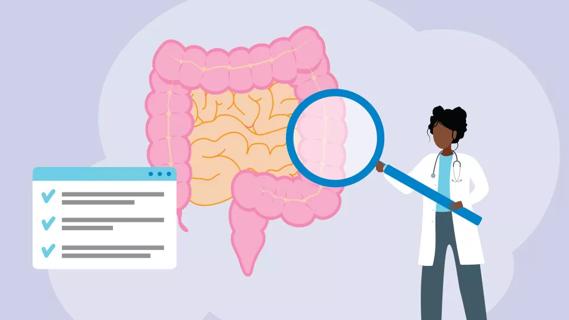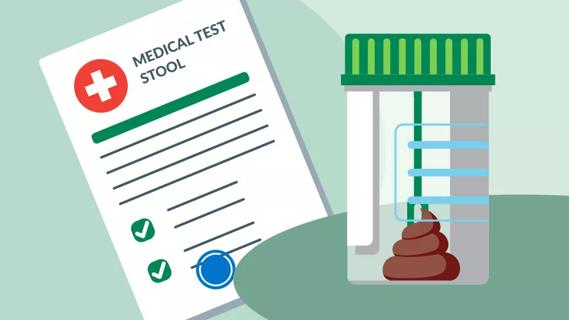Get lots of fiber, cut back on red meat and limit your alcohol intake

If you are what you eat, then it’s important to eat healthfully.
Advertisement
Cleveland Clinic is a non-profit academic medical center. Advertising on our site helps support our mission. We do not endorse non-Cleveland Clinic products or services. Policy
If you’re at high risk for developing colon cancer, certain lifestyle habits help lower your chances of developing colon cancer — and it’s no surprise that a healthy diet is one of them.
Colorectal surgeon Scott Steele, MD, weighs in on what to eat (and what to avoid) to try to maintain colon health and lower your risk of colorectal cancer.
Video content: This video is available to watch online.
View video online (https://cdnapisec.kaltura.com/p/2207941/sp/220794100/playManifest/entryId/1_29i2mzz6/flavorId/1_5f3sgelj/format/url/protocol/https/a.mp4)
Learn how adjusting your diet may decrease the risk of developing colon cancer.
Many types of cancer aren’t preventable. But when it comes to colorectal cancer (cancer of the colon, or large intestine), your lifestyle and habits can play a huge role in helping lower your risk.
In fact, dietary factors may contribute to a whopping 80% of colorectal cancer cases — which means that making the right food choices can go a long way. Here are some tips for a healthy diet to help ward off colon cancer.
“Eat your veggies” is a classic refrain, and for lots of good reasons. Here’s one of them: Eating fruits and vegetables that are high in fiber can help keep colorectal cancer at bay.
“All sources of fiber are beneficial to colon health, but fruits and vegetables are a readily available (and in most cases, delicious) source,” Dr. Steele says. “For the gastrointestinal tract, they speed up the transit time of waste products through the colon, help lower your cholesterol and even help improve symptoms of hemorrhoids.”
Advertisement
Another good source of fiber is whole grains, which are unprocessed and full of healthy vitamins and minerals. A 2020 review found that people who incorporate whole grains into their diet have lower rates of certain types of cancer, including colorectal cancer.
Are you familiar with the word “carcinogen”? It refers to anything with the potential to cause cancer, like tobacco, UV rays and asbestos — and, as it turns out, some meats.
Studies have linked red meat to an increased risk of colorectal cancer. The International Agency for Research on Cancer (IARC) classifies red meat as a Group 2A carcinogen, which is described as “probably carcinogenic to humans.”
Dr. Steele says this is even truer for processed meat, which is meat that has been preserved by smoking, curing, salting or adding chemical preservatives (think bacon, ham, sausage, hot dogs, etc.). Processed meat is classified as a Group 1 carcinogen, which means there’s evidence of carcinogenicity in humans. That puts it in the same group as tobacco and other known harmful substances.
Ultra-processed foods are foods that have been altered to include fats, starches, sugars and hydrogenated oils. They have additives, preservatives and other ingredients that make them taste better and last longer — but they can also take a real toll on your health.
A 2022 study found that ultra-processed foods could increase your risk of colorectal cancer. In particular, it found that men who ate a lot of ultra-processed foods had a 29% higher risk of developing colorectal cancer than men who limited their intake.
A five-year study of more than 77,000 people found that a diet of mostly fruits, vegetables and fish offers the strongest protection from colorectal cancer. Researchers found that adopting a pesco-vegetarian diet was associated with a 45% reduced risk for colorectal cancers compared to people whose diets include meat.
So, what is a pesco-vegetarian diet? More commonly known as a pescetarian diet, this eating style is similar to vegetarianism but incorporates fish and seafood.
The same study showed that vegetarians had 22% lower risk of colorectal cancer compared to meat-eaters, while vegans had a 16% lower risk of colorectal cancer than non-vegetarians.
“Adding seafood to your meal-planning can make it easier to meet your daily nutrient needs while still maintaining a mostly plant-based diet, Dr. Steele says.
If you’re looking for a good example of a pesco-vegetarian diet, look no further than the Mediterranean diet, which emphasizes fresh fruits, vegetables and fish high in omega-3 fatty acids. This eating style can reduce your colorectal cancer risk by as much as 43%.
Advertisement
The U.S. Department of Agriculture’s Dietary Guidelines Advisory Committee has said that the Mediterranean diet “represents healthy approaches to eating that simultaneously address nutrient needs while promoting health and reducing risk of chronic disease.” In addition to seafood, fruits and vegetables, the Mediterranean diet emphasizes whole grains, beans, nuts and olive oil.
“It just goes back to what we’ve been learning over time. The Mediterranean diet is a really healthy diet,” Dr. Steele says. “It keeps us from developing colon and rectal cancers, as well as heart disease and other diseases.”
A study of global cancer deaths found that almost half could be linked to preventable risk factors, including alcohol use. Drinking excessive amounts of alcohol is associated with an increased risk of a variety of health issues, including colorectal cancer.
In general, men should limit alcoholic beverages to two servings a day, while women should limit alcoholic beverages to one serving a day.
Eating a healthy diet and getting enough exercise can both significantly lessen your risk of colon cancer. And it’s also important to know when to get screened for this disease.
Because your risk increases as you age, current guidelines say you should first get screened at age 45. But if you have a family history of colorectal cancer, ask your healthcare provider about being screened sooner — and always make an appointment to discuss any troubling symptoms, like rectal bleeding or unexplained weight loss.
Advertisement
“Every year, colon cancer is one of the leading causes of cancer-related death in the United States alone,” Dr. Steele stresses, “but there’s a lot you can do to lower your risk and to catch the disease in its early stages.”
Advertisement
Learn more about our editorial process.
Advertisement

Focus on exercise, eating healthy and getting regular screenings to help lower your risk

Chronic inflammation from flare-ups can damage the lining of your intestinal wall, making your colon more vulnerable to cancer

Colonoscopies and sigmoidoscopies are types of endoscopies, procedures that look at the health of your large intestine

A steady increase in cases in those younger than 50 started decades ago

If you’re at average risk, it’s recommended that you get your first colonoscopy at age 45

It’s a slow-moving process that offers an opportunity for early detection and treatment

At-home screening options can be good detection tools, but a colonoscopy remains the gold standard

Knowing your family history and getting a genetic test can help detect colorectal cancer earlier

The tropical fruit is a good source of antioxidants and vitamin C

Most people fall asleep within 10 to 20 minutes, but if your experience is different, adjusting your sleep schedule may help

Exploring your hidden side can lead to better understanding of what makes you tick